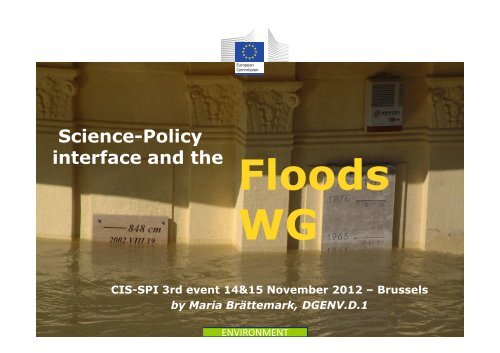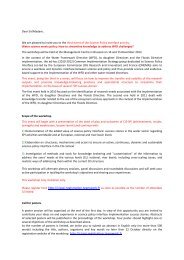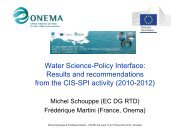SPI and the floods WG - Onema
SPI and the floods WG - Onema
SPI and the floods WG - Onema
You also want an ePaper? Increase the reach of your titles
YUMPU automatically turns print PDFs into web optimized ePapers that Google loves.
Science-Policy<br />
interface <strong>and</strong> <strong>the</strong><br />
Floods<br />
<strong>WG</strong><br />
CIS-<strong>SPI</strong> 3rd event 14&15 November 2012 – Brussels<br />
by Maria Brättemark, DGENV.D.1<br />
ENVIRONMENT
Floods Directive – implementation steps<br />
Preliminary<br />
Flood Risk<br />
Assessment<br />
Flood Hazard<br />
<strong>and</strong> Risk Maps<br />
Scotl<strong>and</strong>,UK.<br />
http://map.sepa.org.uk/nfra/m<br />
ap.htm<br />
Flood Risk<br />
Management<br />
Plans<br />
ENVIRONMENT<br />
Transboundary maps<br />
lower Torne River -<br />
Sweden/Finl<strong>and</strong><br />
http://www.smhi.se<br />
Engl<strong>and</strong> & Wales :<br />
http://www.environmentagency.gov.uk/research/plannin<br />
g/127387.aspx
Floods Directive<br />
- Three stage approach<br />
• Preliminary flood risk<br />
assessment (maps, experience<br />
from past <strong>floods</strong>, predictions of<br />
future <strong>floods</strong>, identification areas of<br />
potential significant flood risk)<br />
• Flood mapping (= knowing areas<br />
at risk of flooding, different<br />
scenarios, flood hazard maps &<br />
flood risk maps),<br />
• Flood Risk Management Plans<br />
(= plans to reduce flood risks,<br />
covering all elements of <strong>the</strong> flood<br />
risk management cycle)<br />
26.11.2009 (Transposition)<br />
26.05.2010 (CA/Unit of management)<br />
22.12.2011 2018<br />
22.12.2013 * 2019<br />
22.12.2015 ** 2021<br />
Review /update every 6 years <strong>the</strong>reafter<br />
Reporting to <strong>the</strong> Commission : 3 months after<br />
* = date of 1st review of pressure <strong>and</strong> impact analysis under <strong>the</strong> WFD<br />
** = deadline for 2 nd cycle WFD river basin management plans<br />
ENVIRONMENT
All aspects of flood risk<br />
management, focus on<br />
Prevention<br />
Protection<br />
Preparedness<br />
What can research projects do to help?<br />
ENVIRONMENT<br />
Photos : BBC website. Funchal <strong>floods</strong>.
Supporting <strong>the</strong> implementation –<br />
<strong>the</strong> Science policy interface <strong>and</strong> <strong>WG</strong> F “Floods”<br />
•<strong>WG</strong> F :<br />
• Policy-lead discussion on<br />
research priorities<br />
• Key research projects invited<br />
to meetings<br />
• Interaction DG Research<br />
• One of <strong>the</strong> platforms for<br />
coordination <strong>and</strong> dissemination<br />
of CRUE Era-net calls<br />
• Thematic workshops<br />
• Compilation of research needs<br />
(to CIS-<strong>SPI</strong>)<br />
ENVIRONMENT<br />
<strong>WG</strong>F Thematic workshops :<br />
• Focussed discussions on<br />
different stages of<br />
implementition<br />
• Projects presenting progres<br />
results<br />
• Conclusions includes<br />
collection of research<br />
priorities (to CIS-<strong>SPI</strong>)
Thematic workshops : 2007-2012<br />
L<strong>and</strong> use (I &II)<br />
Flood mapping<br />
More use of cognitive research on flood risk perception<br />
Role of wetl<strong>and</strong>s <strong>and</strong> natural water retention to be enhanced.<br />
Improve transboundary methods <strong>and</strong> practics for flood mapping.<br />
Preliminary Flood Risk<br />
Assesment<br />
Catchment Approach<br />
Climate Change<br />
Flood Risk Management Plans<br />
Flash Floods <strong>and</strong> Pluvial <strong>floods</strong><br />
Economics<br />
Stakeholder Involvement<br />
Improve knowledge of <strong>the</strong> significance of different types of <strong>floods</strong>.<br />
There is a lack of empirical data on <strong>the</strong> performance of natural approaches to<br />
managing <strong>the</strong> sources <strong>and</strong> pathways of flood waters which both demonstrates <strong>the</strong><br />
relative cost effectiveness when compared to, for example, civil engineering<br />
solutions, <strong>and</strong> <strong>the</strong>ir effectiveness under different flood conditions<br />
Improve <strong>the</strong> consistency of Climate Change information <strong>and</strong> its consequences for<br />
different sectors <strong>and</strong> stakeholders<br />
More knowledge is needed on decision making in an uncertain environment<br />
More data on <strong>the</strong> effectiveness of natural water retention measures is needed.<br />
Increased use of innovative consultation practices (MCAs)<br />
Prioritisation of measures.<br />
Improve data availability, density <strong>and</strong> quality concerning rainfall, water discharges<br />
<strong>and</strong> sediment transport<br />
Impact on mental health in economic assessments<br />
Improvement of valuation of benefoits of flood risk $managemen<br />
Social networking was identified as having potential in generating broad, nonprofessional<br />
involvement in flood risk management; however <strong>the</strong> best means of<br />
using social media is not clear.<br />
ENVIRONMENT
Recommendations<br />
•<br />
of <strong>WG</strong> F – Thematic<br />
workshop on Flash<br />
Floods <strong>and</strong> Pluvial<br />
Floods<br />
ENVIRONMENT
Cagliari recommendations (1)<br />
• The specific time-scale features requires effective methodologies <strong>and</strong> tools to<br />
share experiences <strong>and</strong> methods among different communities <strong>and</strong><br />
organisation.<br />
• Flash flood <strong>and</strong> pluvial flood timing <strong>and</strong> durations reduce possibilities of<br />
intervention for risk reducing/mitigating <strong>and</strong> require new approaches in<br />
hazard assessment techniques;<br />
• Implementation of flood warning systems <strong>and</strong> community self-help<br />
programs is <strong>the</strong>refore one of <strong>the</strong> most effective ways to manage <strong>the</strong><br />
flash flood risk.<br />
• A multi-sectorial <strong>and</strong> multi-disciplinal approach is <strong>the</strong>refore required to<br />
address in an integral way flash <strong>floods</strong> <strong>and</strong> pluvial <strong>floods</strong> risk<br />
management.<br />
• There is a need to focus research on rainfall estimation, nowcasting <strong>and</strong><br />
forecasting in order to increase <strong>the</strong> efficiency of <strong>the</strong> systems devoted to<br />
monitor flash flood generating storms<br />
ENVIRONMENT
Cagliari recommendations (2)<br />
• Numerical wea<strong>the</strong>r prediction (NWP) models are currently available at spatial <strong>and</strong><br />
temporal resolutions that make <strong>the</strong>m attractive for hydrological applications also<br />
in small watersheds <strong>and</strong> potentially for flash<strong>floods</strong>. However, <strong>the</strong> skill in<br />
predicting precipitation has to be improved<br />
• St<strong>and</strong>ard use of post-flood survey is recommended to ga<strong>the</strong>r flood response<br />
data (flow types, flood peak magnitude <strong>and</strong> time, damages, social response) with<br />
<strong>the</strong> objective to advance underst<strong>and</strong>ing of such events (including development of<br />
data archives) <strong>and</strong> improve assessment of vulnerability aspects (economical,<br />
social, ecological, etc.).<br />
• To warn <strong>the</strong> public it is necessary to make a better attempt to underst<strong>and</strong><br />
<strong>the</strong> public <strong>and</strong> be understood by <strong>the</strong> public by changing/improving <strong>the</strong><br />
language <strong>and</strong> terminology used. This includes advancing methodologies to<br />
present uncertainties to end users.<br />
• Appropriate tools (i.e. web-based platforms) should be developed to advance<br />
<strong>and</strong> share experience/skill on use of forecasting systems for flash flood<br />
events (which are locally rare).<br />
ENVIRONMENT
Some concluding thoughts...<br />
• Policy lead review of resarch needs important<br />
• Flood risk managers/users to be involved in <strong>the</strong> design of<br />
projects, throughout of project results in useful outcomes<br />
• Time scale <strong>and</strong> scope of research most useful for policy makers<br />
• Projects need to take on board views expressed…<br />
• Multi hazard , multi disciplinary approach needed.<br />
• New CIS – Targeted mini-seminars inviting research projects to<br />
reply to specific questions asked by <strong>WG</strong>F – focus on policy<br />
relevant results.<br />
ENVIRONMENT
Thank you for your attention !<br />
More information<br />
http://ec.europa.eu/environment/water/index_en.htm<br />
ENVIRONMENT<br />
WISE Floods Directive Viewer<br />
water.europa.eu




